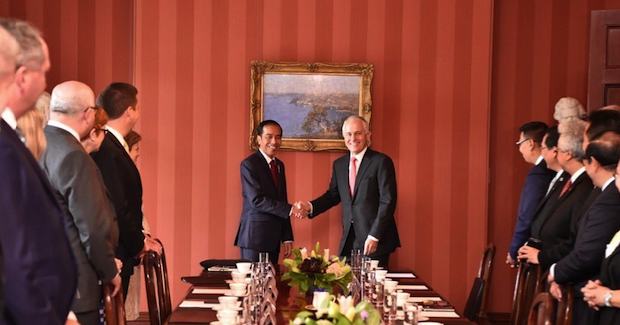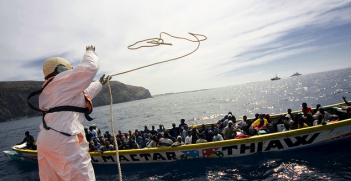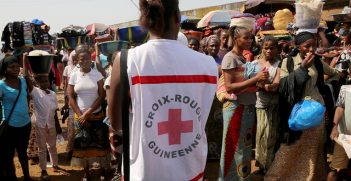Jokowi’s Visit Heralds New Optimism for Bilateral Trade

After worrying delays, Indonesian President Widodo has finally met with Prime Minister Turnbull in Sydney. In spite of the countries’ past animosities, Australia-Indonesia trade cooperation may now finally live up to its potential.
The last visit by an Indonesian president to Australia was characterised as a missed opportunity by the Indonesian side. Commenting on then Prime Minister Julia Gillard’s Darwin meeting with then President Susilo Bambang Yudhoyono in 2012, Indonesian vice-presidential advisor and foreign policy expert Dewi Fortuna Anwar observed that the leaders were talking at “cross purposes”. She noted that whilst Gillard “focused on security issues, the strategic environment and the asylum seeker problem”, President Yudhoyono “promoted Indonesia as a land of market opportunities for trade and investment”.
Five years on, one sees a welcome shift in policy emphasis with trade and investment priorities front and centre of bilateral discussions during President Joko Widodo’s (Jokowi) Sydney visit over the weekend. No doubt this emphasis reflected the priorities of both countries, but the visit’s style and substance were different in a number of ways.
First, Australia’s preoccupation with threats emanating from Indonesia was less apparent. With uncertainty around the United States’ Asia policy under President Trump, the ongoing need to counter youth radicalisation and China’s continuing militarisation of islands in the South China Sea, security issues were, of course, still on the agenda of the bilateral talks in Sydney.
Agreement was reached on a joint declaration enhancing maritime cooperation with an associated Plan of Action. The talks also reaffirmed the cooperation undertaken by both the ‘2+2 Meetings’ of foreign and defence ministers and the recent Ministerial Council on Law and Security—with commitments to enhance cooperation on counter-terrorism, cyber security, transnational organised crime, and illegal, unreported and unregulated fishing.
Finally, the lingering uncertainty over the status of the defence relationship ended with the statement made by the two leaders’ joint declaration on the “full restoration of defence cooperation, training exchanges and activities”.
Economic cooperation
Although security issues were still on the agenda for Jokowi’s visit to Australia, they did not dominate the discussions as in previous years. Rather, Jokowi’s points of discussion suggested greater policy attention to the trade and investment potential of the bilateral relationship and recognition of the importance of non-government actors in bilateral engagement.
It is widely recognised that Australia’s trade and investment relationship with Indonesia is relatively weak given the market significance of Indonesia’s consumer class (estimated to grow to 85 million by 2020) and the size of Indonesia’s economy relative to others in Southeast Asia (more than double the other economies combined in Southeast Asia). There are a number of causal factors explaining this weakness, apart from Canberra’s previous preoccupation with security issues.
Indonesia’s bureaucratic red tape, corruption and lack of legal certainty has long made Australian companies wary of investing in the country. For years Indonesia had ranked poorly by world standards on both the World Banks’s Ease of Doing Business surveys and Transparency International’s (TI) Corruption Perception Index. Moreover, economic nationalism and suspicions about ‘exploitative’ foreign capital remains an enduring part of the Indonesian national psyche.
Since his inauguration in 2014, however, Indonesia’s ‘infrastructure president’ has worked to improve the investment climate for foreign capital. Bureaucratic red tape has been reduced, business licensing has been expedited and the need to continually renew company registration certificates has been ameliorated. Partly as a result of such policy changes, Indonesia has risen in both the World Bank and TI indices. Certainly, Australian business has taken note, with leaders from the mining, retail, tourism and healthcare sectors meeting directly with President Widodo and his senior delegation in Sydney.
Formalising trade
The Indonesia-Australia Comprehensive Economic Partnership Agreement (IA-CEPA) formed the centrepiece of bilateral discussions in Sydney. In essence a comprehensive free trade agreement, it provides for improved market access for Australian and Indonesian goods and services, relaxed visa provisions and reductions in both tariff and non-tariff barriers. Early announcements—just prior to and during President Widodo’s visit—included a reduction in Indonesian tariffs on imported Australian sugar, a move by the Indonesian Ministry of Agriculture from quarterly to annual live cattle import quotas and the abolition of tariffs on pesticides and herbicides from Indonesian suppliers.
Both governments have committed to finalising the IA-CEPA by the end of this year, which builds on the foundations of the ASEAN Australia New Zealand Free Trade Agreement signed in 2010. Australia’s announcement that it will host the ASEAN-Australia Special Summit Meeting in 2018 is further recognition of Australia’s common economic and strategic interests with the Southeast Asian sub-grouping.
Personalising relations
Inherent in preparations surrounding Jokowi’s visit was greater sensitivity to the cultural and people-to-people dimensions of the relationship. Jokowi’s program included a visit to Darling Harbour International Convention Centre where he met with hundreds of excited members of the Indonesian expatriate community. Whilst in recognition of Indonesians’ embrace of social media, Australia’s ambassador to Indonesia posted a heart-warming Twitter video featuring suggestions by Australian school children on what Indonesia’s president should do and eat whilst in Australia.
Jokowi and his wife Iriana also enjoyed a private dinner held at Malcolm and Lucy Turnbull’s Point Piper residence—a noticeable departure from the fussier state dinner format. Dinner was followed by an early morning walk in Sydney’s Botanical Gardens where members of the public warmly greeted both leaders.
There is little doubt that the personal rapport between Jokowi and Turnbull, combined with their entrepreneurial backgrounds, has seen renewed commitment by both countries to capitalise on the economic potential of the relationship. Moreover, since Turnbull’s tenure as prime minister, bilateral interactions have been characterised by a more informal, contemporary style congruent with the personalities of both leaders.
Indeed, personal rapport between leaders is a critical variable in determining the stability of Australia-Indonesia relations. This is due to the frequency of bilateral political tensions based often on sovereignty concerns and differences in cultural values. In Sydney it also became apparent, however, that Jokowi’s lack of interest in international political issues, in this instance at least, was a distinct advantage to Australia. As he explained to an adoring crowd at Darling Harbour: “I don’t want to talk much about politics, it’s confusing. Let’s just talk about the economy.”
Dr Greta Nabbs-Keller is an adjunct lecturer at the University of Queensland’s School of Political Science and International Studies (POLSIS-UQ) and director of Dragonminster Consulting.
This article is published under a Creative Commons Licence and may be republished with attribution.





